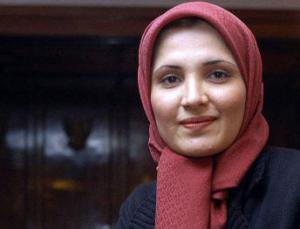Iran Feature: How a Political Prisoner Found Art for Her Activism (Bozorgmehr)
 Hengameh ShahidiNajmeh Bozorgmehr writes for the Financial Times:
Hengameh ShahidiNajmeh Bozorgmehr writes for the Financial Times:
After two years in prison for protesting against rigged elections, Hengameh Shahidi, an Iranian journalist and human rights activist, picked up a paintbrush for the first time. Freed from Evin prison – where she was held in solitary confinement and allegedly tortured – art offered her a release.
“I still do not understand how a violent atmosphere has woken up a delicate part of me,” she says.
Now she hopes her paintings will help raise awareness about the plight of 200 or so political prisoners still in Iranian jails, many of them forgotten or ignored by a population afraid to speak out.
Weary of political protest that seems to achieve little, she says art can help bring about social change in the “bigger jail than Evin, which is Iran”.
Ms Shahidi, 37, was one of hundreds imprisoned for fomenting unrest during protests after the disputed 2009 presidential election. More than 100 people were killed in the biggest protests yet against the Islamic regime. Activists fear that this year’s June election to choose Mahmoud Ahmadi-Nejad’s successor as president may also be violent. Ms Shahidi was sentenced to six years in jail for backing the opposition Green movement, which said the 2009 election was rigged.
Two years later, she was released on health grounds because of an injury to her spinal cord --- allegedly caused during detention. Tehran denies that torture takes place in its prisons. On Friday, an exhibition of her work opened in Shokouh gallery in northeast Tehran.
Her paintings reflect Ms Shahidi’s desire for peace and freedom. One shows a prisoner’s hand stretching out of the iron bars of the prison cell’s window to give an olive branch to a pigeon. In another painting, an unarmed person presses a finger into the mouth of a gun.
“I started my paintings with a dream of freedom and breathing in an atmosphere in which there is no fighting because both sides [the regime and the opposition] have been losers,” she says.
Clad in a top-to-toe black chador, strict Islamic dress, from under which her turquoise scarf and crisp white shirt peek out, Ms Shahidi says she has almost recovered from post-traumatic stress disorder caused by the four months spent in solitary confinement and, she says, torture.
Her interrogators tried to get her to admit she had affairs with leading politicians Mehdi Karroubi and Mohammad Khatami, the former reformist president – scandalous and dangerous claims in a country as conservative as Iran.
Little is done to help political prisoners, she said. The threats of execution, detention or exclusion from university education have deterred many from voicing their concern.

 Saturday, January 5, 2013 at 7:00
Saturday, January 5, 2013 at 7:00
Reader Comments